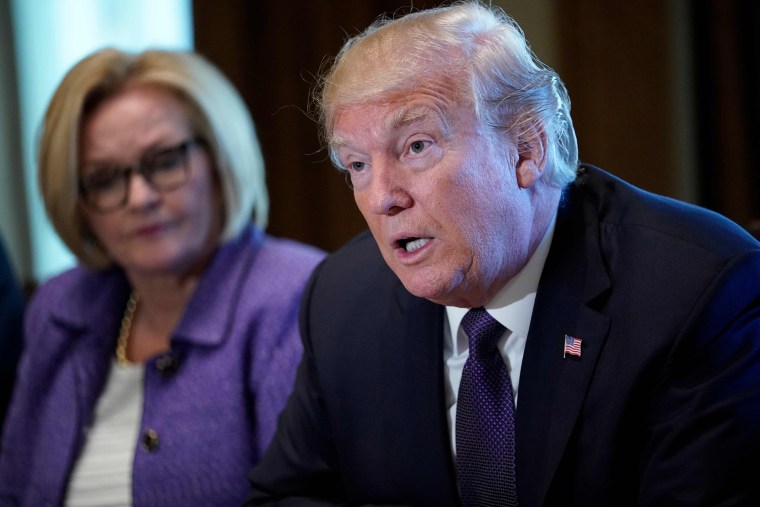WASHINGTON — President Donald Trump disavowed a bipartisan health care agreement on Wednesday, delivering it a likely fatal blow only a day after he praised its approach and said he had personally encouraged its negotiation.
Sens. Lamar Alexander, R-Tenn., and Patty Murray, D-Wash., had spent weeks working on the bill, which was designed to stabilize insurance markets under Obamacare by guaranteeing cost-sharing reduction (CSR) payments that Trump had recently cut off. In exchange for Republican cooperation, Democrats would agree to modest measures loosening Obamacare regulations and allowing insurers to sell less comprehensive plans to more customers.
In a tweet Wednesday, Trump thanked Alexander and Murray for their efforts, but said he "can never support bailing out [insurance companies]."
It was a confusing shift from Tuesday when Trump, while criticizing the CSR payments, praised the emerging agreement as a "short-term deal" that would calm insurance markets until Republicans could pass a full Obamacare replacement later on.
"The solution will be for about a year or two years, and it will get us over this intermediate hump," Trump said at the time, adding he had been "involved" in the talks himself.
His latest criticism appeared to catch the bill's lead Republican sponsor off-guard.
"The president called me 10 days ago and asked me to work with Senator Murray to do this," Alexander told reporters on Wednesday morning. "He called me last Saturday, we talked about it, he called me this morning."
Trump’s sudden characterization of the Alexander-Murray effort as "bailing out" insurers was a particular blow given that the explicit goal of negotiations from the outset was to authorize the CSR payments. Trump withdrew them earlier this month, citing legal concerns: An ongoing House Republican lawsuit argues they were improperly drafted under Obamacare.
"As it stands right now, without the president supporting it, I don't think you have the votes in the House or the Senate to do it," said Sen. John Thune, R-S.D.
Alexander held out hope on Wednesday that the president would eventually support his efforts, however, saying they were in agreement that the legislation include measures to prevent insurers from using CSR money to increase profits rather than lower premiums.
Murray also said she planned to continue working with Alexander to find co-sponsors for bill.
"I don’t respond to the president’s tweets," she told reporters on Wednesday. "I respond to getting the job done working with Lamar to get this passed."
But Minority Leader Sen. Chuck Schumer, D-N.Y., who has long backed the bipartisan negotiations, assailed Trump for sending mixed signals and accused the White House of backing away to appease "the hard right."
Schumer linked it to a broader pattern of inconsistency, saying Trump had also projected a willingness to make a deal with Democrats to protect young undocumented immigrants, or Dreamers, only to retreat to more hardline demands later on.
"He keeps changing his mind on issue after issue, and that shows an appalling lack of leadership," Schumer said at a news conference. "Now he said today that it would benefit the insurance companies. He ought to read the bill before he tweets."
A memo circulating among Republican Senate offices Wednesday warned there would be "chaos without cost-sharing," citing Congressional Budget Office estimates that a failure to authorize the payments would raise premiums, leave millions with no insurance options, and increase federal deficits. The memo also suggested Democrats would use the resulting upheaval as a "four-lane highway to [a] single payer solution."
The CSR payments reimburse insurers for reducing deductibles for low-income customers, but the companies must provide the same benefits under the law regardless of whether they continue. Insurers in most states have already raised premiums significantly for 2018 based on the explicit assumption that Trump, who had long threatened to cut off CSR spending, would eventually do so.

